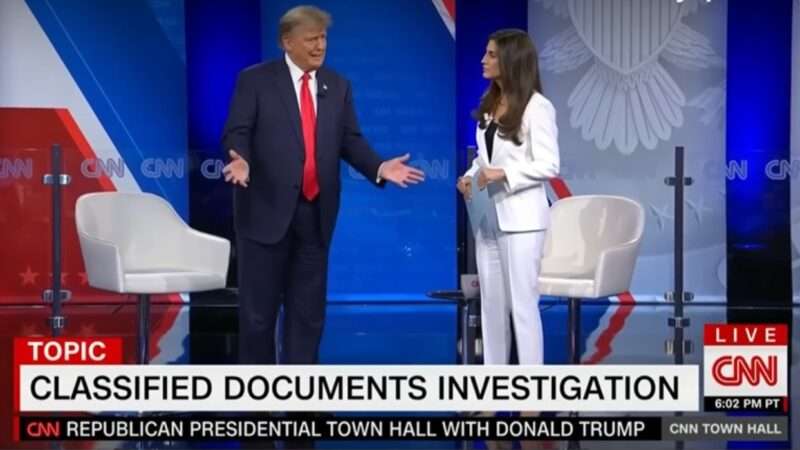
Sometime this month or next, the Supreme Court is expected to tell President Joe Biden that he can't forgive $400 billion in student loan debt without congressional authorization. That plan is one of several ways in which Biden has embraced an expansive view of executive power that elevates his own preferences above the law.
Unfortunately, that is a bipartisan tendency, as Donald Trump, the leading contender to oppose Biden in the 2024 presidential election, recently reminded us. During his town hall on CNN last week, the former president showed a disregard for the rule of law and separation of powers at least as troubling as Biden's.
CNN's Kaitlan Collins asked Trump why he retained thousands of presidential records, including hundreds that were marked as classified, when he left office in January 2021. "I have the absolute right to do whatever I want with them," he claimed.
As Collins pointed out, that is simply not true. Under the Presidential Records Act of 1978, "the United States shall reserve and retain complete ownership, possession, and control of Presidential records."
As Trump himself noted, Congress enacted that law because Richard Nixon "had a lot of problems." Specifically, Nixon had threatened to destroy presidential documents that Congress thought should be protected to promote transparency and preserve the historical record.
Yet here was Trump, insisting that he was not bound by that judgment or by a law that makes it a felony to "conceal" or "remove" government documents. The "absolute right" that Trump asserts evidently also nullifies a law that makes it a felony to improperly retain "information relating to the national defense" that "could be used to the injury of the United States or to the advantage of any foreign nation."
The personal prerogative that Trump perceives may also explain why he failed to fully comply with a federal subpoena seeking all documents at Mar-a-Lago that bore classification markings. Collins repeatedly asked him about his apparent defiance of that subpoena, which was the main justification for the FBI's August 8 search of Mar-a-Lago and remains a central issue in Special Counsel Jack Smith's obstruction investigation. Trump repeatedly dodged the question.
Trump's disregard for legal constraints on presidential power was also apparent in his response to an audience question about his unilateral ban on bump stocks, a gun accessory that facilitates rapid firing. Two federal appeals courts have ruled that the ban was illegal.
In that regard, Trump's policy resembles the Biden administration's attempts to ban pistol stabilizing braces and "ghost guns." Trump not only does not recognize this commonality; he does not even acknowledge that it is problematic to legislate under the guise of regulation. "Bump stocks are actually a very unimportant thing," he said.
Trump also had a hand in the national eviction moratorium that the Supreme Court rejected in 2021, saying it "strains credulity" to suppose that Congress had given the Centers for Disease Control and Prevention (CDC) the "breathtaking amount of authority" it asserted. Although it was the Biden administration that unsuccessfully defended the CDC's repeated extensions of that policy, it was Trump who first embraced it.
The dubious legal theory underlying the eviction moratorium was broad enough to accommodate all manner of edicts aimed at reducing the spread of COVID-19, including the national mask mandate that both Trump and Biden (eventually) conceded was beyond the president's power. Trump also erroneously asserted that he had "total" authority to lift state-imposed lockdowns during the pandemic.
Whether it was building a border wall that Congress had declined to fund, launching military strikes without congressional authorization, or withholding funds from states that allowed broad use of mail-in ballots, Trump's position was clear: He would do what he wanted, regardless of what Congress said.
Biden has a similar attitude, as illustrated by his student loan plan, his gun control initiatives, and his ill-fated vaccine mandate. But Republicans are fooling themselves if they think Trump would be any better in this respect.
© Copyright 2023 by Creators Syndicate Inc.
The post Trump's Disregard for the Rule of Law Is at Least As Bad As Biden's appeared first on Reason.com.







